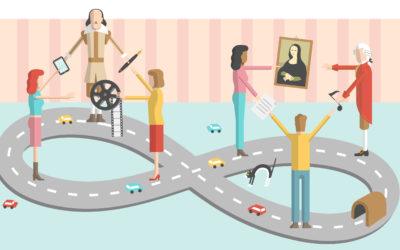1. Is it possible to lend purchased content to others?
In the UK, when you purchase an analogue copy of a work (e.g. a CD, a DVD, a book), the rightsholder cannot control the distribution of that copy any longer (this is called exhaustion of rights). This means that you can resell or lend that copy to others without the copyright owner’s consent. However, this principle does not always apply to online distribution, meaning that if you purchase something online, like a song from iTunes, you often cannot share or lend that digital copy. Usually in these cases the end-user licence states what you can or cannot do with that work.
It is important to notice that the exhaustion of rights applies only to the single analogue copy you purchase, not to the creative work within the analogue copy. Therefore, whilst you are allowed to lend a CD you have purchased to your family or friends, if you want to use some of its tracks in the production of new work (e.g. a video), then you would need to get permission from the copyright owner.
2. How many notes can be used from someone else’s song?
In UK Copyright Law there are no rules about the exact number of notes that can be used from someone else’s song. Although it is natural to be inspired by other songs when producing new music, there is a fine dividing line between simply being inspired and copying. In the UK, your song is considered original, and thus protected by copyright, if you use your own skill, labour, judgement and effort to create it as opposed to merely interpret someone else’s piece of music. In order to be protected, your song needs to be fixed in writing or some other permanent form.
The number of notes used in a song is not a criterion to assess originality. It is the quality of the part taken that matters, not the quantity. A tune consisting of only a few notes can carry copyright. For example, Fourscore by Lord David Dundas – the signature tune used by Channel 4 for ten years – is copyright protected even though it includes only four different notes.
Another basic principle of copyright law is that it protects only the expression of ideas, not the ideas themselves. This can be crucial when writing the lyrics of a song; for example, the fact that U2’s Pride (In the Name of Love) is copyright protected should not prevent you from writing your own song about Martin Luther King, Jr., as long as your work is substantially different and you add your own skill, labour, judgement and effort on it. You can find more information about originality here and here.
3. Is there a maximum length that can be used from an original song?
As there are no rules about the exact number of notes, there are no provisions about a maximum length that can be used from an original song either. According to UK Copyright Law, using another’s song is copyright infringement when ‘the work as a whole or any substantial part of it’ has been copied. The meaning of these terms is not precise and they are considered on a case-by-case basis. Usually the court focuses on the quality of the parts taken, not necessarily the amount, and the circumstances of each work. You can find more information about using someone else’s work here.
For a good review of music plagiarism cases heard before the English courts, check the CREATe Public Lecture by Dr Simon Anderson.
Related
Going for a Song
Going for a Song tells the story of Tina and Ben, a music composer and a lyricist who create an original song and discuss how to market it.
Using & Reusing
When creating new work, it is natural to be inspired by the work of others. However, there is an important distinction between simply being inspired and unlawfully copying.
Getting Permission
When you want to use a work that is in copyright, you need to get permission from all copyright owners. Some works have several rights attached to them and each right may have more than one owner…











